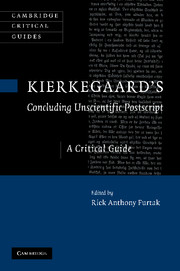Book contents
- Frontmatter
- Contents
- List of contributors
- Acknowledgments
- List of abbreviations
- Introduction
- 1 The “Socratic secret”: the postscript to the Philosophical Crumbs
- 2 Kierkegaard's Socratic pseudonym: A profile of Johannes Climacus
- 3 Johannes Climacus' revocation
- 4 From the garden of the dead: Climacus on interpersonal inwardness
- 5 The Kierkegaardian ideal of “essential knowing” and the scandal of modern philosophy
- 6 Lessing and Socrates in Kierkegaard's Postscript
- 7 Climacus on subjectivity and the system
- 8 Humor and irony in the Postscript
- 9 Climacus on the task of becoming a Christian
- 10 The epistemology of the Postscript
- 11 Faith and reason in Kierkegaard's Concluding Unscientific Postscript
- 12 Making Christianity difficult: The “existentialist theology” of Kierkegaard's Postscript
- Bibliography
- Index
6 - Lessing and Socrates in Kierkegaard's Postscript
Published online by Cambridge University Press: 04 August 2010
- Frontmatter
- Contents
- List of contributors
- Acknowledgments
- List of abbreviations
- Introduction
- 1 The “Socratic secret”: the postscript to the Philosophical Crumbs
- 2 Kierkegaard's Socratic pseudonym: A profile of Johannes Climacus
- 3 Johannes Climacus' revocation
- 4 From the garden of the dead: Climacus on interpersonal inwardness
- 5 The Kierkegaardian ideal of “essential knowing” and the scandal of modern philosophy
- 6 Lessing and Socrates in Kierkegaard's Postscript
- 7 Climacus on subjectivity and the system
- 8 Humor and irony in the Postscript
- 9 Climacus on the task of becoming a Christian
- 10 The epistemology of the Postscript
- 11 Faith and reason in Kierkegaard's Concluding Unscientific Postscript
- 12 Making Christianity difficult: The “existentialist theology” of Kierkegaard's Postscript
- Bibliography
- Index
Summary
Two historical figures, separated by more than two millennia but linked by their understanding of the essential tasks of teaching and learning, play important roles in Johannes Climacus' Concluding Unscientific Postscript to the Philosophical Crumbs. One of them, Socrates, is associated in Crumbs with an account of learning that seems to be a dead end from the perspective of faith, but appears in Postscript in what one might call (with apologies to Plato) a new and beautiful guise: that of Climacus' primary example of the subjective existing thinker. The other, the eighteenth-century dramatist, critic, and essayist Gotthold Ephraim Lessing, is never mentioned in Crumbs but looms large in Postscript. The core of Postscript – Part Two, “The subjective problem. The subject's relation to the truth of Christianity, or what it is to become a Christian” – begins with “Something on Lessing,” the title of the first of two sections of this second and last part of the book. “Something on Lessing,” in turn, is divided into two chapters: “An expression of gratitude to Lessing” and “Possible and actual theses of Lessing.” Why does Climacus pay special attention to Lessing in taking up the issue of what it means to become a Christian? And why does he go on to reintroduce Socrates in the context of Christian faith – a context in which Socrates' understanding of the relationship of human beings to the truth would seem, at least according to the stark opposition between philosophy and faith that Climacus sketches in Crumbs, to be irrelevant?
Keywords
- Type
- Chapter
- Information
- Kierkegaard's 'Concluding Unscientific Postscript'A Critical Guide, pp. 111 - 131Publisher: Cambridge University PressPrint publication year: 2010

